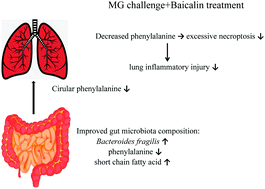Baicalin ameliorates Mycoplasma gallisepticum-induced inflammatory injury in the chicken lung through regulating the intestinal microbiota and phenylalanine metabolism
Abstract
Baicalin shows excellent protective effects against Mycoplasma gallisepticum (MG) induced inflammatory injury as discussed in our previous studies. However, the physiological effects of baicalin are notable in contrast to its low bioavailability, and the critical mechanism for the protective effects of baicalin against MG infection is still unclear. The main objective of this study was to investigate whether baicalin alleviates MG-induced lung inflammatory injury through regulating gut microbiota. Using an MG infection model, results showed that baicalin treatment significantly reduced MG colonization and ameliorated the abnormal pathological changes in the lung. Baicalin treatment also reduced the level of proinflammatory cytokines and suppressed proinflammatory protein expression. Notably, MG infection changed the gut microbiota composition, however, the abnormal gut microbiota composition was partially alleviated by baicalin treatment. Baicalin significantly enriched the commensal bacterium Bacteroides fragilis, and gavaged with Bacteroides fragilis alleviating MG infection-induced inflammatory injury in the lung. In addition, baicalin reversed peripheral accumulation of phenylalanine induced by MG infection. Importantly, increased phenylalanine induced excessive necroptosis through the modulation of gga-miR-190a-3p-Fas-associated protein with death domain (FADD) axis in HD11 macrophages. Together, our findings highlighted the role of gut microbiota and phenylalanine metabolism in MG infection and confirmed that baicalin could effectively inhibit MG-induced inflammatory injury in the lung by remodeling the gut microbiota and phenylalanine metabolism.



 Please wait while we load your content...
Please wait while we load your content...